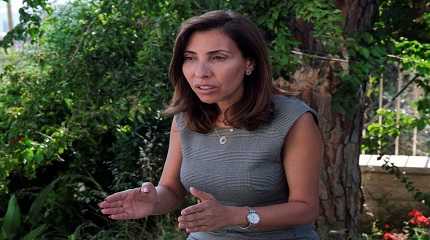
BEIRUT, May 19 (Reuters) - When Halime El Kaakour enters Lebanon's parliament as a newly elected lawmaker next week, she will step past the same concrete barriers that security forces erected to keep her and other protesters out during massive anti-government rallies in 2019.
Powered by that protest movement and popular anger over the financial implosion that followed, about a dozen activists and reform-minded newcomers like her were elected to the 128-member legislature on Sunday.
"You don't want us to enter parliament as normal citizens? You blocked us and put up walls? Well, now we're entering as MPs," Kaakour, who has a PhD in public international law and teaches at the Lebanese University, told Reuters.
Reform-minded candidates ran without the financial resources or staff of established factions but still won more than 200,0000 votes, second only to powerful armed group Hezbollah, gaining seats across Lebanon's electoral districts and sects.
It marked a significant break from politics-as-usual in Lebanon, where a handful of parties claiming to represent the country's mosaic of religious sects have dominated politics since a 1975-90 civil war.
"People can't believe it... We are planting hope, and God willing, we will harvest change," said Kaakour, 46, and the only Sunni Muslim woman in parliament.
Their wins weren't the only surprises in Sunday's poll. Shi'ite armed movement Hezbollah and its allies lost the majority they had won in 2018, while their opponents - the Christian Lebanese Forces party - made sizeable gains.
Analysts say that could heighten sectarian tensions as the LF pushes for Hezbollah's disarmament - but most new candidates say there are more pressing issues at hand.
'THE BATTLE IS ECONOMIC'
They blame established parties for policies that unleashed an economic crisis that has pushed nearly three-quarters of Lebanon's population under the poverty line and seen the local pound lose more than 90 percent of its value.
"For more than 30 years, they have been saying the same things, while electricity and water and education were at rock-bottom and they divided spoils and stole," Kaakour said.
"The priority now is to respond to people's crisis of living... the battle is economic par-excellence."
Elias Jrade, an eye surgeon who won a seat in Hezbollah's south Lebanon stronghold, told Reuters he would seek to reform the healthcare system, electricity woes and public schools.
Jrade unseated one of Lebanon's longest-sitting MPs: 70-year-old Assaad Hardan, who had been in parliament for 30 years.
The slender Christian Orthodox said he ran because of his daughter's urge to join anti-government demonstrations after the Beirut port blast of 2020, which many blame on safety failings by senior officials.
"I thought, shame on me. My 16-year-old daughter wants to protest to build a nation for me. That should be my duty," he told Reuters, holding back tears. He spoke three days after the election, between back-to-back operations at his Beirut clinic, which he said he intends to continue as MP.
"You'll know I've betrayed you the minute I stop working here. I feed myself and others off the sweat of my brow - so if I stop working, I'll be feeding off of the sweat of your brow instead," said Jrade.
Like-minded newcomers have been meeting to align their positions, but Jradi said he preferred not to form a single party so each could continue to operate independently. Either way, Jrade said, he doesn't plan to be in parliament for long.
"If in four years, I get asked to run again - that means I failed. I failed to prepare young people to take over, from every region, every faction, from the far-left to the far right."




